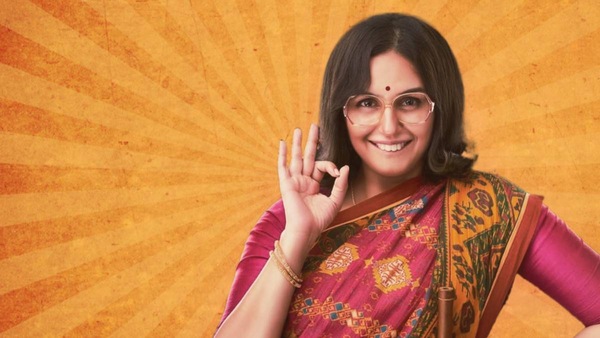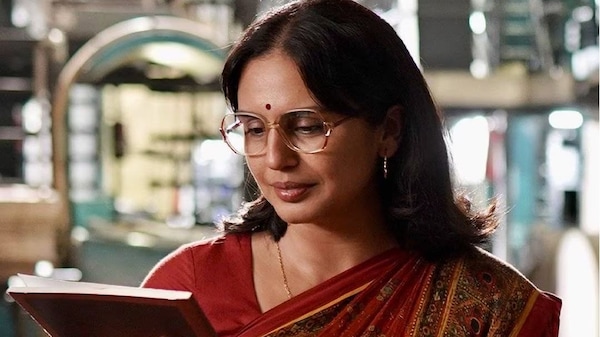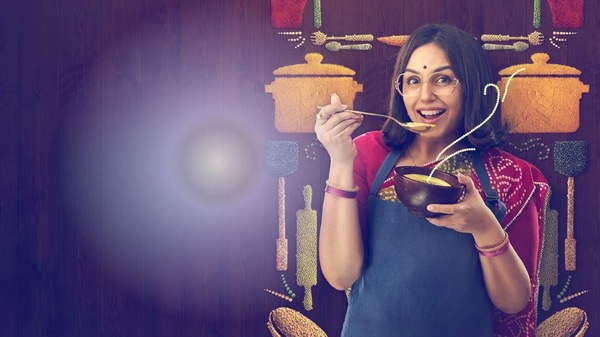Tarla: A Bland Offering That Fritters Its Prime Ingredient
This is #CriticalMargin, where Ishita Sengupta gets contemplative over new Hindi films and shows. Here: Huma Qureshi's Tarla.

Last Updated: 03.57 PM, Jul 07, 2023
PIYUSH GUPTA’s Tarla opens with a really vacuous voiceover. The story, a man informs us, is not about Tarla Dalal, the amateur chef who became a culinary giant and transformed home cooking. Instead, it is about a time when Tarla and other other women like her wanted to do something in their lives. Objectively and subjectively, it means nothing. No biopic, however narrow in ambition, can be comprehended in isolation. This is the film stating the obvious, egging us on to view it as a depiction of a person and not an analysis of a persona. But Gupta’s outing is so basic in every way possible, so bereft of inspiration that it unfolds as neither, doing grave injustice to the trailblazing woman at the center.
In a country like India where cooking is inherently linked to gendered labour and compulsion, the significance of someone like Dalal cannot be stressed enough. Through her long career (she passed away in 2013 at the age of 77), the celebrated chef wrote over 100 cooking books and headlined her own show on television. But more crucially, through her life, she offered an alternative discourse that exalted the idea of cooking to passion from coercion. That a woman was responsible for it, opened up her subject position as a fascinating site to understand social conditioning and individual will. Tarla, the biopic on her, shares none such curiosity, eagerness or even interest. Gupta’s outing, admittedly, intends on portraying her before she had become a culinary star. Through its course, however, it says nothing about Tarla, Tarla Dalal or the women of the time that we wouldn’t have known.
The film opens in Pune. Tarla (Huma Qureshi) studies in college, hoping to be somebody. One day, she comes home and overhears her parents discussing marriage. An engineer from Mumbai and his family are about to visit her. Her mother asks, ”Tarla ko dekhne aa rahe hain?” (“They are coming to see Tarla?”). Her father responds, “Nahi, chakhne” (“No, to taste”). Honestly, this was the first narrative red flag. But much like life, I chose to ignore it. From here Tarla quickly resorts to a story we are all familiar with. She meets her future husband Naleen Kumar (Sharib Hashmi; Nalin Dalal in real life), a young man who wins her over by pledging support to anything she wishes to do. Life catches up soon. They have three three kids and Tarla’s dream of doing something gets relegated to a footnote. She does household chores, packs tiffin for her family. Then, something changes.

One day, her husband forgets his tiffin at home. When Tarla goes to his factory to drop it, she sees him relishing mutton, much to her dismay. This leads to domestic warfare in their vegetarian household. Days after nursing grudges, Tarla decides to revamp her cooking style by making vegetarian food in non-vegetarian style. Her husband is impressed, and so is her neighbour. The latter sends her daughter, on the verge of getting married, to Tarla to learn cooking. This too is a success, galvanising her reputation overnight and prompting other parents to approach her with similar requests.
If you have read enough interviews of Tarla Dala, you would know what happens from here. She starts giving cooking lessons at home and finally finds her purpose. Her husband helped her in publishing her first book, The Pleasures of Vegetarian Cooking in 1974, which sold exceedingly well, opening up the path for an enduring career. All of this is in the public domain, familiar if not explicitly well-known.
Gupta not just relays these details to the most mundane beats possible but also restricts himself to surface-level exploration. At all given points in time, Tarla aims to be a simplistic retelling of what is undeniably a captivating story, while diminishing her achievements. The film tells us nothing about Dalal’s desire, ambition or even what kindled her passion in cooking when she must have been forced to learn it. Replete with one montage after another, it unravels in the aesthetic of a music video where a woman cooks one dish after the other, and her family at the dining table erupts in joy. The treatment is so painfully superficial that it is impossible to be taken by it. For instance, when Tarla starts teaching women at the house, the tone is comical. The focus is always on others — the way her classes disturb other people in the society, disrupting their afternoon siesta — never on her. This is baffling because for a housewife in the ‘90s, this must have been a critical juncture, probably persuading her for the first time to exercise some control over her life.

The larger problem here, of course, is laziness. Laziness in storytelling which reduces the fascinating journey of a woman who chartered her own path to a stereotypical soap opera-like tale where her husband, hitherto supportive, becomes jealous and bitter over one sly remark. Laziness in craft which prevents reimagining the obstacles she might have braved as anything other than a jaded family crisis. When she ventures out to do her show, what holds her back is her unwell son, hostile husband. While these might be true, they also become a shorthand to not delve into her personhood and underline the private dilemmas she must have (also) undergone: was she confident enough? Was she eager to do it or coaxed? By the time the film concludes, we get more insight into her family than into her mind. As a final proof of this narrative indolence, Amarjeet Singh is cast as a scrap dealer, entrusted to reprise his role from Kapoor & Sons, where he played the plumber.
Retelling a familiar story need not always be a shortcoming. Nora Ephron’s Julie & Julia comes to mind where the life of the American culinary pioneer Julia Child (Dalal was often considered her counterpart in India) is rendered as a parallel narrative to that of an admirer. The style is salient because it justifies the almost hyperreal version of Child’s life. It comes across as flawless to a fault because we are essentially watching her through Julie Powell’s elevated vision. We are, and should be, invested in Powell, a misfit writer who blogs about cooking Child’s recipes to go through bad days.
But with Tarla, the approach is too straight-forward to attempt such stylistic inventiveness.
The late chef occupies the narrative centrepiece and yet the film could be about any other cook and it wouldn’t make a difference. Qureshi, an otherwise gifted performer, is an odd choice for the titular role. The physicality does not align (Dalal was not tall), her Gujarati accent is inconsistent, and the fake teeth are a distraction. There is also no scene, save one, where we actually see her cooking, cutting vegetables or just displaying chops which would justify the casting. If the film is to be believed, Tarla Dalal’s sole credit resides in revamping vegetarian dishes in non-vegetarians style.
Hashmi, on the other hand, is earnest as the devoted husband who has a sudden change of heart. The more contrived his character became, the worse I felt to witness such a talented actor being wasted in sub-par films.
Written by Gupta and Gautam Ved, Tarla is a classic example of men envisioning a woman’s success story. The problems are familiar, the solutions are easy. The storytelling is too caught up in safeguarding legacy to invite engagement nor scrutiny. In between, a transcendental life gets reduced to anecdotes. And the woman who had lived it is reduced to a bystander, removed a step further from staking claim to her own narrative.
(Disclaimer: The views expressed in this column are those of the author and do not necessarily reflect the official policy or position of OTTplay. The author is solely responsible for any claims arising out of the content of this column.)
